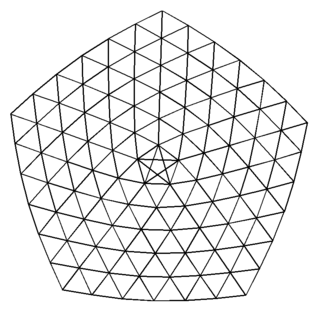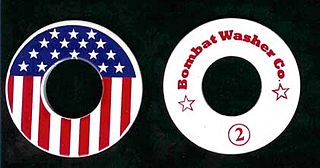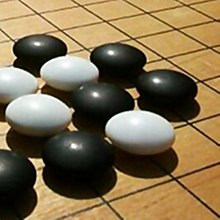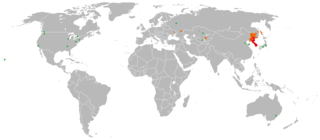Scrabble is a word game in which two to four players score points by placing tiles bearing a single letter onto a board divided into a 15×15 grid of squares. The tiles must form words that, in crossword fashion, read left to right in rows or downward in columns, and be included in a standard dictionary or lexicon.

Nine men's morris is a strategy board game for two players dating at least to the Roman Empire. The game is also known as nine-man morris, mill, mills, the mill game, merels, merrills, merelles, marelles, morelles and ninepenny marl in English. The game has also been called cowboy checkers and is sometimes printed on the back of checkerboards. Nine men's morris is a solved game – one in which either player can force the game into a draw. Its name derives from the Latin word merellus, 'gamepiece'.

The game of Go has simple rules that can be learned very quickly but, as with chess and similar board games, complex strategies may be deployed by experienced players.

The rules of Go have seen some variation over time and from place to place. This article discusses those sets of rules broadly similar to the ones currently in use in East Asia. Even among these, there is a degree of variation.

Within most systems and at most levels in the game of Go, a handicap is given to offset the strength difference between players of different ranks.

Spades is a trick-taking card game devised in the United States in the 1930s. It can be played as either a partnership or solo/"cutthroat" game. The object is to take at least the number of tricks that were bid before play of the hand began. Spades is a descendant of the Whist family of card games, which also includes Bridge, Hearts, and Oh Hell. Its major difference as compared to other Whist variants is that, instead of trump being decided by the highest bidder or at random, the Spade suit always trumps, hence the name.

Carrom is a cue sport-based tabletop game of South Asian origin. The game is very popular in India, Bangladesh, Afghanistan, Nepal, Pakistan, Sri Lanka and surrounding areas, and is known by various names in different languages. In South Asia, many clubs and cafés hold regular tournaments. Carrom is very commonly played by families, including children, and at social functions. Different standards and rules exist in different areas.

*Star is a complex abstract strategy game by Ea Ea, a designer of Y. It is a redevelopment of his earlier game Star.

Alhambra is a 2003 tile-based German-style board game designed by Dirk Henn. It was originally published in Germany by Queen Games in a language-interdependent version; an English-specific version was released in North America by the now-defunct Überplay. The game is an Arabian-themed update, set during the construction of the Alhambra palace in 14th century Granada, of the 1998 stock trading board game Stimmt So!, which in turn was an update of the 1992 mafia influence board game Al Capone; the original version was subsequently released as Alhambra: The Card Game.

Puzzle Pirates is a massively multiplayer online game developed by Three Rings Design, a company acquired by Sega Sammy Holdings in 2011. The player takes the role of a pirate, adventuring on the high seas and pillaging money from roaming enemy ships. The mechanics of Puzzle Pirates are driven by puzzles. For example, to effectively sail a ship, players must play puzzle games representing work at the sails for speed, pumping bilge water to remove it from the ship, and carpentry to fix any damage the ship may take.

Washer pitching is a game, similar to horseshoes, that involves teams of players that take turns tossing washers towards a box or hole. The game has many variations, and may be called washer pitching, washer toss, washers, huachas or washoes.
Tom Clancy's ruthless.com is a turn-based strategy video game based on Tom Clancy's Power Plays novel "ruthless.com". It was published in 1998 by Red Storm Entertainment. ruthless.com puts the player in the position of CEO of a new software company. The game features a campaign mode, six different scenarios of varying difficulty, and a multiplayer option.

FreeStyle Street Basketball (FSSB) is a massively multiplayer online sports game made by JC Entertainment and with cel-shaded graphics. It is a fast paced, arcade styled representation of half court streetball, self-described as being Hip-Hoop. Players team up with one another to challenge other online players to matches of basketball that are characterized by high tempo, freedom of movement, and a premium placed on synergy and teamwork. Players can also create clubs and enter club matches, play in a single player story mode, roam around in Open Court mode, drop and add skills as needed, and choose from millions of different outfits to express themselves due to the sheer quantity of wearable items in the ingame shop.

Doraemon Wii - Secret Tool King Tournament known in Japan as Doraemon Wii - Himitsu Douguou Ketteisen is a video game based on the manga and anime series Doraemon. It was released in Japan on December 6, 2007 for the Nintendo Wii game console.

Haggis is a shedding card game similar to Tichu, Zheng Fen, and other East Asian climbing games. Haggis has received praise for being the first to successfully create a climbing, trick-taking game, designed from the start for two to three players, where most previous games required four players or more. The evenly distributed, face card "bombs" are a notable innovation for the genre, helping even out hand strength enough to make two-person play workable, and enhancing the strategic element of the game.

7 Wonders is a board game created by Antoine Bauza in 2010 and originally published by Repos Production in Belgium. 7 Wonders is a card drafting game that is played using three decks of cards featuring depictions of ancient civilizations, military conflicts and commercial activity. The game is highly regarded, being one of the highest rated games on the board game discussion website BoardGameGeek. 7 Wonders has won a total of more than 30 gaming awards, including the inaugural Kennerspiel des Jahres connoisseurs' award in 2011.

Bierlachs, also Bierskat or Lachs, is a variant of Germany's national card game, Skat, that is predominantly played for beer in pubs and restaurants.















